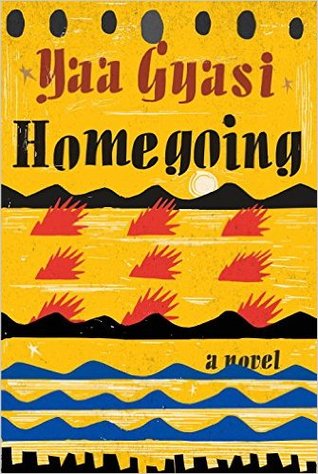Author info: Facebook
Publisher: Knopf
Pages: 320
Format: ARC
Source: Publisher provided for review
Buy the book: Barnes & Noble | Amazon | The Book Depository
Two half sisters, Effia and Esi, unknown to each other, are born into different villages in eighteenth-century Ghana. Effia is married off to an Englishman and will live in comfort in the palatial rooms of Cape Coast Castle, raising children who will be sent abroad to be educated before returning to the Gold Coast to serve as administrators of the empire. Esi, imprisoned beneath Effia in the Castle's women's dungeon and then shipped off on a boat bound for America, will be sold into slavery.I often have a hard time with books people label as the "next big thing" or any variation thereof, so it's weird for me to pick up something like Homegoing, a novel for which the author reportedly received at least one million dollars for her advance, without too many expectations. But I did, because I didn't know about the hype when I read the synopsis, and really not even when I sat down to read. I don't think I'd have had any problems with this one, though, because Homegoing is remarkable.
Stretching from the wars of Ghana to slavery and the Civil War in America, from the coal mines in the American South to the Great Migration to twentieth-century Harlem, Yaa Gyasi's novel moves through histories and geographies.
Following half-sisters Effia and Esi's lines from their births in the eighteenth century all the way to present day, Homegoing sets itself an ambitious task. Each chapter follows a different descendant, alternating between Effia and Esi's sides, with means we never spend too much time with any one character. In the scope of these character's lives, we're only seeing a moment--yet Gyasi does an amazing job making sure we know them. And we do. While we're only seeing bits, we're seeing the most important pieces, those moments that define these characters and their futures. From generation to generation, there are ups and downs, uplifting and heartbreaking moments, and we see how decisions affect those who come after.
When someone does wrong, whether it is you or me, whether it is mother or father, whether it is the Gold Coast man or the white man, it is like a fisherman casting a net into the water. He keeps only the one or two fish that he needs to feed himself and puts the rest in the water thinking that their lives will go back to normal. No one forgets that they were once captive, even if they are now free.Gyasi is constantly exploring the repercussions of slavery on a people--and not only the British people's responsibility on the Gold Coast, but also its own people, the Asante and Fante tribes who sold one another into slavery--to be sure, but she also, with each generation, looks at how one's family molds a person's life and the changing construct of home (which makes sense, given the title). For Effia and Esi's families, their home has deceived and destroyed them in some way, and making peace with that history is understandably difficult.
And though I loved Homegoing, the chapters can be a little uneven. Some are so unbelievably strong, doing exactly what they were written to do, while there are a couple that pale in comparison. Those read as short stories that don't quite fit, and their endings, while sensible, don't leave you in the right place.
It's books like Homegoing that remind me why I love reading so much. I picked it up without expectation, knowing only what I'd read on the book itself, and found an experience, a novel I'll never forget, and certainly an education.

About the author:
Yaa Gyasi was born in Ghana and raised in Huntsville, Alabama. She holds a BA in English from Stanford University and an MFA from the Iowa Writers’ Workshop, where she held a Dean’s Graduate Research Fellowship. She lives in Berkeley, California.
The quote used in this review is from an advance, uncorrected proof of the book, and may not be exactly what is published in the finished copy.



No comments:
Post a Comment